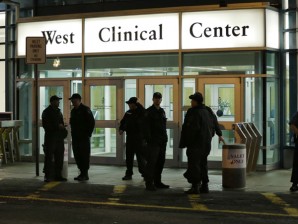
Police stand guard outside Beth Israel Deaconess Medical Center Friday, April 19, 2013 after an ambulance carrying Dzhokhar Tsarnaev, a19-year-old Massachusetts college student wanted in the Boston Marathon bombings, arrived. Tsarnaev is hospitalized in serious condition with unspecified injuries after he was captured in an all day manhunt. (AP Photo/Elise Amendola)
BOSTON— A doctor involved in treating the Boston Marathon bombing suspect who died in a gunbattle with police says he had injuries head to toe and all limbs intact when he arrived at the hospital.
Dr. David Schoenfeld said 26-year-old Tamerlan Tsarnaev was unconscious and had so many penetrating wounds when he arrived at Beth Israel Deaconess Medical Center early Friday that it isn’t clear which ones killed him, and a medical examiner will have to determine the cause of death.
The second bombing suspect, 19-year-old Dzhokhar Tsarnaev, was in serious condition at the same hospital after his capture Friday night. The FBI has not allowed hospital officials to say any more about his wounds or condition.
Schoenfeld lives in the Boston suburb of Watertown and heard explosions from the shootout between the two brothers and police early Friday. He called the hospital to alert staff they likely would be getting injured people, then rushed in to coordinate preparations.
“We had three or four trauma teams in different rooms set up and ready,” unsure of whether they would be treating a bombing suspect, injured police or bystanders, Schoenfeld said.
The older Tsarnaev’s clothes had been cut off by emergency responders at the scene, so if he had been wearing a vest with explosives, he wasn’t by the time he arrived at the hospital, the doctor said.
“From head to toe, every region of his body had injuries,” he said. “His legs and arms were intact — he wasn’t blown into a million pieces” — but he lost a pulse and was in cardiac arrest, meaning his heart and circulation had stopped, so CPR, or cardio-pulmonary resuscitation, was started.
Schoenfeld said he couldn’t discuss specific treatments in the case except to say what is usually done in such circumstances, including putting a needle in the chest to relieve pressure that can damage blood vessels, and cutting open the chest and using rib-spreaders to let doctors drain blood in the sac around the heart that can put pressure on the heart and keep it from beating.
“Once you’ve done all of those things … if they don’t respond there’s really nothing you can do. You’ve exhausted the playbook,” he said.
After 15 minutes of unsuccessful treatment, doctors pronounced him dead.
“We did everything we could” to try to save his life, Schoenfeld said.
How did the medical team react to treating the bombing suspect?
“There was some discussion in the emergency room about who it was. That discussion ended pretty quickly,” Schoenfeld said. “It really doesn’t matter who the person is. We’re going to treat them as best we can.”